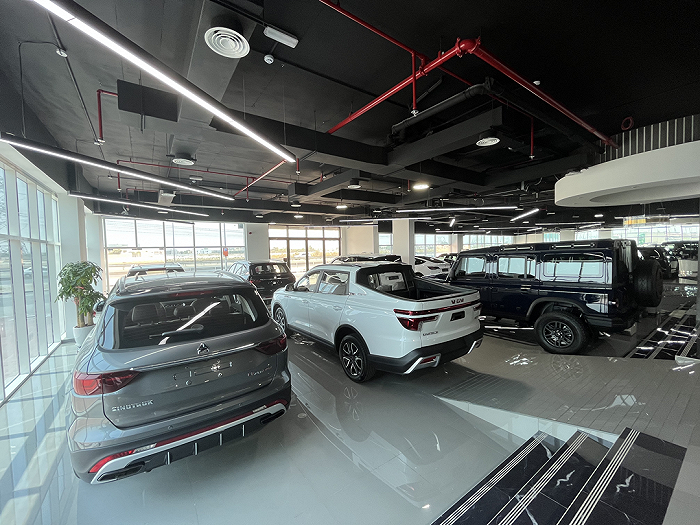Les entreprises chinoises de voitures à énergies nouvelles sont le fer de lance de l’expansion du marché du Moyen-Orient
Cela peut sembler improbable, Mais une transformation extraordinaire se déroule actuellement dans l'une des régions les moins dépendantes du monde.
À travers des métropoles animées comme Dubaï et Abu Dhabi, Au cœur du Moyen-Orient, Un phénomène inattendu a émergé. Les places de stationnement les plus recherchées dans chaque centre commercial ne sont plus réservées aux véhicules luxueux à essence; Ils sont maintenant dédiés aux voitures électriques.

(Image: Dubai Motor Trading Company)
“Aujourd’hui, Les stations de charge prospèrent à chaque centre de consommation, complexe de bureaux, et enclave résidentielle à travers les EAU, avec des véhicules électriques naviguant parfaitement dans le paysage urbain. Mais il y a quelques années à peine, La notion de charges de charge dans les centres commerciaux était un rêve lointain, Et peu ont été vus,” Juno partagé, le directeur régional des ventes d'une éminente société de négociation automobile, Basé à Dubaï.
Cette étreinte rapide de la mobilité électrique illustre la transition remarquable du Moyen-Orient. Despite its relatively recent entry into the Véhicule à énergie nouvelle arena, Les progrès de la région ont été tout simplement étonnants.
A regular commuter in Dubai can now witness a captivating sight on their daily route: a sleek vehicle accelerating with unmatched swiftness. Traditionnellement, this spectacle was reserved for high-performance gas-guzzlers like Lamborghinis; toutefois, nowadays, the odds are high that the speeding car is a Chinese electric vehicle.
The secret to this electrifying acceleration lies in the ingenious design of these cars, which can reach 100 kilometers per hour in a mere 3 Secondes. En revanche, the most celebrated fuel-powered brands like Lexus, Mercedes-Benz, and BMW, after years of development, require over 6 seconds for the same feat.
This transformation hasn’t gone unnoticed by industry insiders like Juno, who recognize that the Middle East is fast becoming a pivotal overseas market for China’s burgeoning electric vehicle sector.
Statistics from the China Association of Automobile Manufacturers underscore this burgeoning trend. Cumulative vehicle exports data from January to November 2022 spotlight the Middle East as a thriving destination, with countries like Saudi Arabia, the United Arab Emirates, and other nations making a notable contribution. Export figures grew an impressive 2.7 times compared to the previous year.
Dans 2023, China’s new energy vehicles continue to dazzle on the global stage. Recent reports from the China Association of Automobile Manufacturers reveal that the first half of the year witnessed a staggering 76.9% year-on-year increase in complete automobile exports, accounting for a remarkable 2.341 millions d’unités. This marked growth led to an export value of $46.42 milliard, a figure that surged by 1.1 times. In an unprecedented turn, China’s automotive exports have overtaken Japan’s for two consecutive quarters, cementing its position as the world leader.
As China’s automotive prowess reverberates globally, emerging markets have begun to take note of the nation’s advancements in new energy vehicles.
As evidence of this new reality, NIO secured a monumental $1.1 billion strategic investment from CYVN Holdings, an Abu Dhabi-based investment institution, in late June. This move, coupled with the recent cooperation agreements of other prominent Chinese electric vehicle manufacturers, sparked vibrant discussions within the industry. En outre, just a few weeks later in July, companies like Jikrypton and Xiaopeng unveiled ambitious plans in Israel.
With unwavering momentum, Chinese electric vehicles are accelerating their presence into the heart of the Middle East, embodying a seismic shift in the region’s automotive landscape.
 Auto en Chine
Auto en Chine